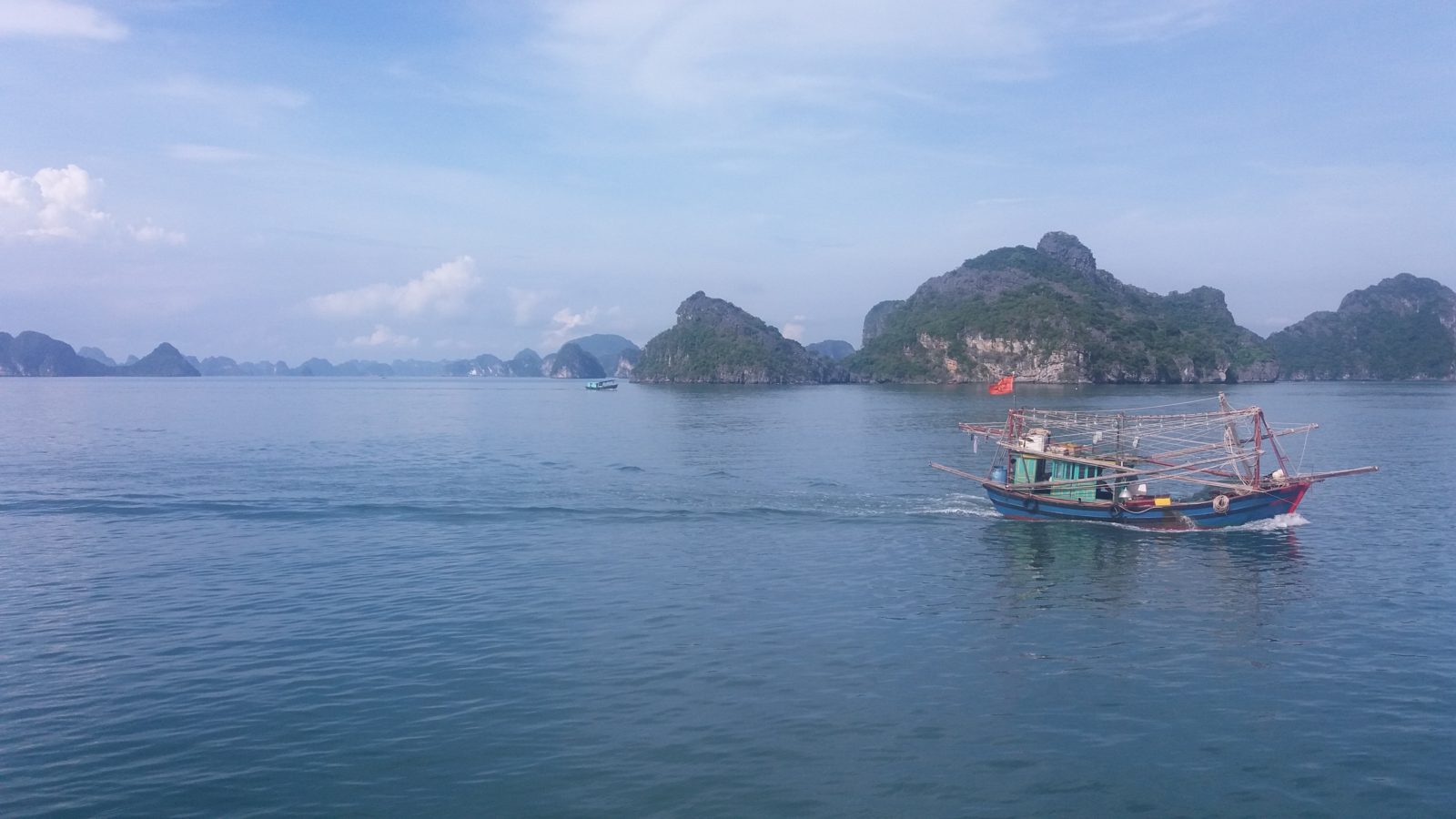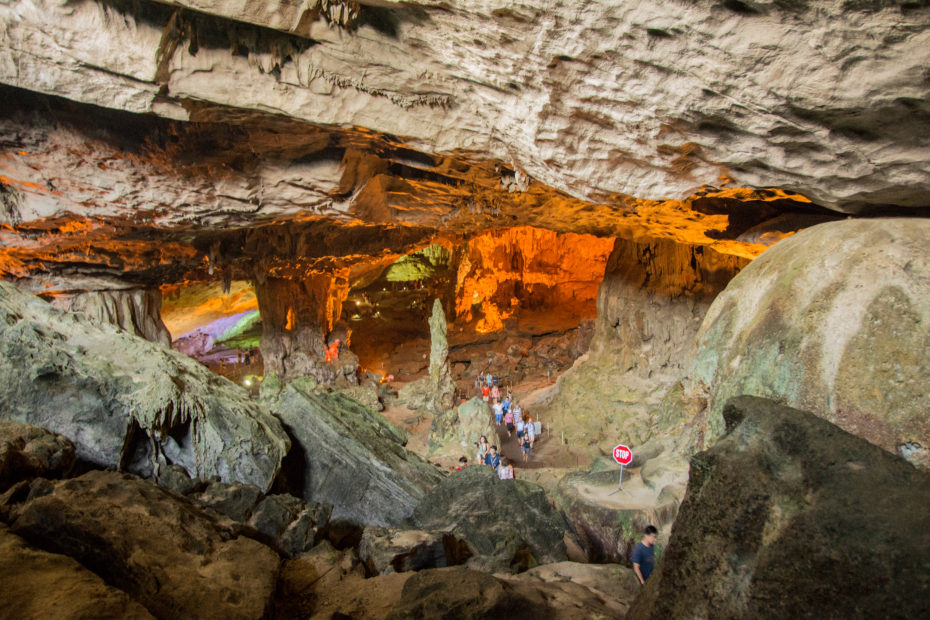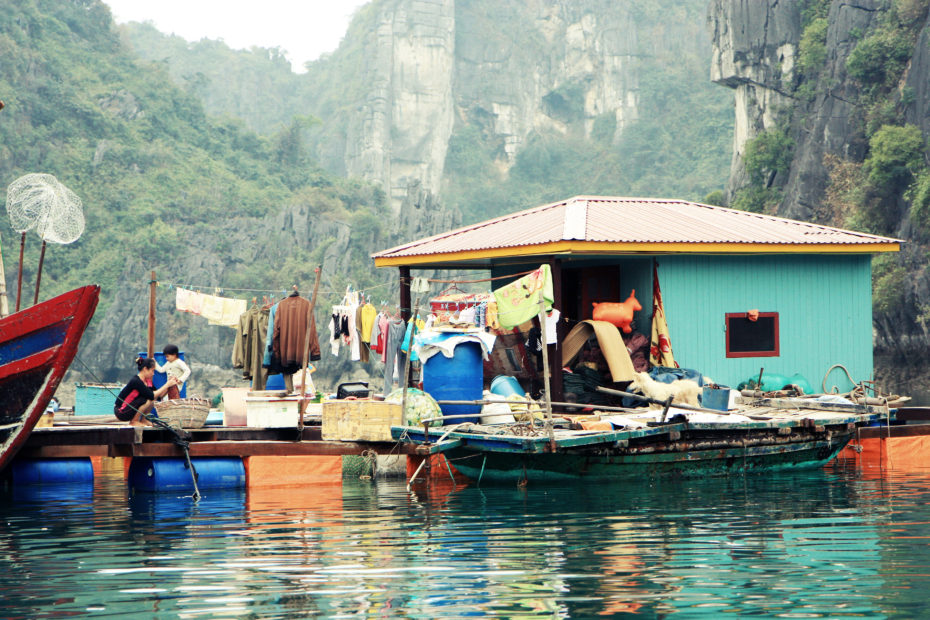When in Vietnam, doing a cruise on Halong Bay is apparently a non-negotiable itinerary item. If you are foolish enough to say you might skip Halong Bay, you will be treated by locals and other tourists alike as a stupid and miserly pariah. I had no doubt that thousands of limestone pinnacles rising out of the ocean would be beautiful, but I had also read that the bay has become extremely overdeveloped, with tourist numbers seemingly unrestricted and scant regulation to protect the natural beauty of the bay that drew the tourists in the first place. Given this, I wasn’t sure if it would be worth going. Especially given that it is quite often a very expensive trip. There are cheap cruise options, but horror stories about dangerous boats and trashy, loud drinking sessions abound. As it happened, I was travelling with my Mum and she had generously offered to pay, given that my backpacker budget didn’t allow for such a luxury. I wasn’t going to say no.
After a 120 km trip from Hanoi to the port which somehow took four hours, we were deposited at a series of air-conditioned demountable buildings overlooking the boats, where guides darted about locating their assigned passengers from a melee of luggage and sweating tourists. We had booked to go on a two-night cruise on a twenty-cabin boat, but had been upgraded to a tiny, more luxurious boat with a total of six tourists and seven crew members. Our guide Thuan plucked us from the chaos with military precision and we were soon boarding a beautiful wooden boat and settling into our luxurious bedroom with its own balcony and a bathroom with not one but two showers and a bath. Over lunch we met our fellow passengers – a lovely young couple from Canada, Jess and Mike, and another (apparently long-distance) couple – a Vietnamese woman called Hong and a software developer who lived in the USA.
We had a relentless schedule of eating five-course meals and visiting the tourist attractions of the bay. First up was a huge cave on a limestone island, which was lit up with surreal sunset colours. It was very crowded but Thuan said this was nothing compared to peak tourist season. Lots of the stalagmites had been blackened by people touching them but it was still impressive in a surreal way. A puppy had somehow got into the cave and was racing around. Flashes from people’s mobiles were like hundreds of tiny supanovas in this underground universe.
Next we visited a beach where about 500 people were swimming. The water felt lovely but I was also hesitant to put my head under knowing that there could be faecal matter floating about! 5,500 tourists cruise Halong bay every day, and the IUCN (International Union for Conservation of Nature) found that the majority of boats dispose of untreated waste water straight into the bay. Worse, even those boats that actually have treatments systems rarely use them! After our swim, we climbed up a few hundred stairs to a little pagoda overlooking the islands below and obediently took a selfie to prove our achievement. Later that night, after dinner, we were supposed to do squid fishing, but all we caught was plastic bags.
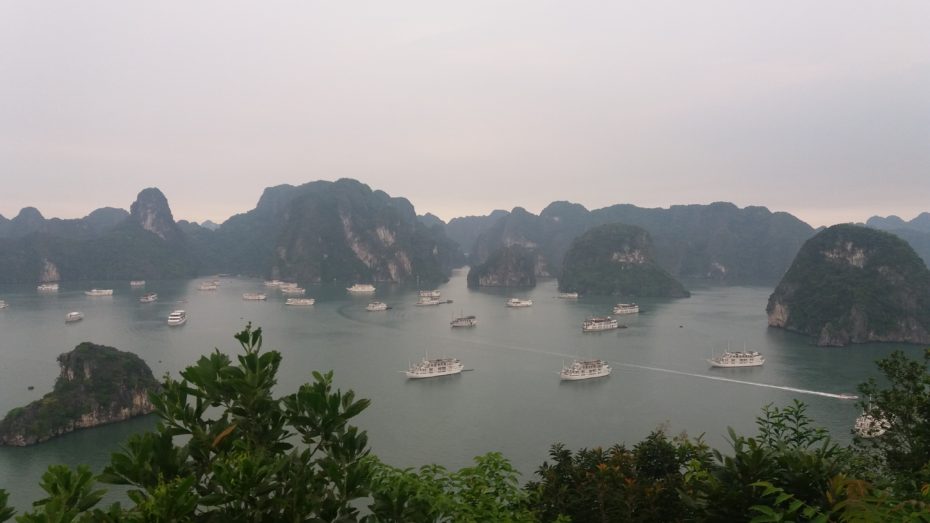
The hazy view from the top of Titop Island
The next morning started with Tai Chi on the deck of the boat before breakfast. We then visited a floating fishing village, where we were rowed around the bay by a local man with a gentle smile, who told us (through Hong’s translating) that there weren’t enough fish anymore so he stopped fishing to do this instead. We passed a collection of residential boats complete with TVs and dog kennels, an abandoned floating ‘school’ and squid-fishing vessels with light-bulbs hanging in chains above them like decorations in a hipster restaurant. Till seven months ago, this had been a community of 450 people, but after the government restricted fishing in the area to protect the bay, it had shrunk to less than 100 people.
The whole floating-village experience seemed like a bit of a voyeuristic circus, with fleets of fluoro-vested tourists cruising past houses snapping shots of kids who looked back indifferently, and local women who managed to ignored us as they got on with preparing the next meal. I couldn’t see this community still living here in 10 or 20 years time. Maybe they were making enough rowing tourists around to keep them here for a while, but life seemed pretty limited with so little infrastructure and only a handful of job options.
Later that afternoon we stopped at one of the designated overnighting bays alongside ten or so other boats. We went for a kayak as the sun dipped behind the limestone and found a little bay filled with milk-coloured jellyfish and plastic bags that seemed to imitate their living counterparts. It frightened me. Was this plastic soup a heralding of what our whole ocean would look like in the future? At least you could see this plastic – in our western world it’s out-of-sight, out-of-mind, but it’s still there – Sydney Harbour and the fish that swim in it are filled with microscopic plastic particles. Mum and I collected a big bagful of rubbish but couldn’t bring ourselves to pick up the dirty nappy that, it as it turned out, was the reason the bay smelled like shit.
We heard a lot of people blame the trash problem on Chinese tourists, whom the Vietnamese seem to have little love for. But it’s not fair to paint tourism as the only thing causing the degradation of Halong Bay. Floating villages are the source of a lot of rubbish, and often have no proper garbage disposal systems. The floating houses are often built on cheap Styrofoam which quickly breaks apart, filling the bay. A combination of overfishing and waste-dumping is causing fish and shellfish populations to drop precipitously. On top of this, last year the worst floods in 40 years caused run-off from the area’s thousands of hectares of open-pit coal mines to overflow inadequate holding dams and run into the bay. The bay is also surrounded by three coal-fired power stations, which I can’t prove, but strongly suspect were major contributors to the haze that sat over the scenery during our trip. It definitely didn’t have the romance of natural veils of mist. The bay is under siege from many threats.
A place is much more than its ‘look’. What really makes a place special is its feel. And with all the activities impacting Halong Bay, it doesn’t feel very special. It feels like tourists are being pumped through like it’s a factory. 73% of tripadvisor reviews mention the pollution. Intangible though it might sound, there is no reverence here. The scenery is stunning, but the experience feels slightly hollow. Could you do it differently? I didn’t have the chance to explore alternatives, but skipping Halong Bay and doing a cruise on a different bay that is cleaner and more remote could be a good option – as long as you go with an environmentally responsible company that isn’t going to just trash the next beautiful place. Simply going to Cat Ba Island (in Halong Bay) via the cheap ferry and exploring the national park there and seeing the limestone karsts from the top of a mountain could also be a really good idea.
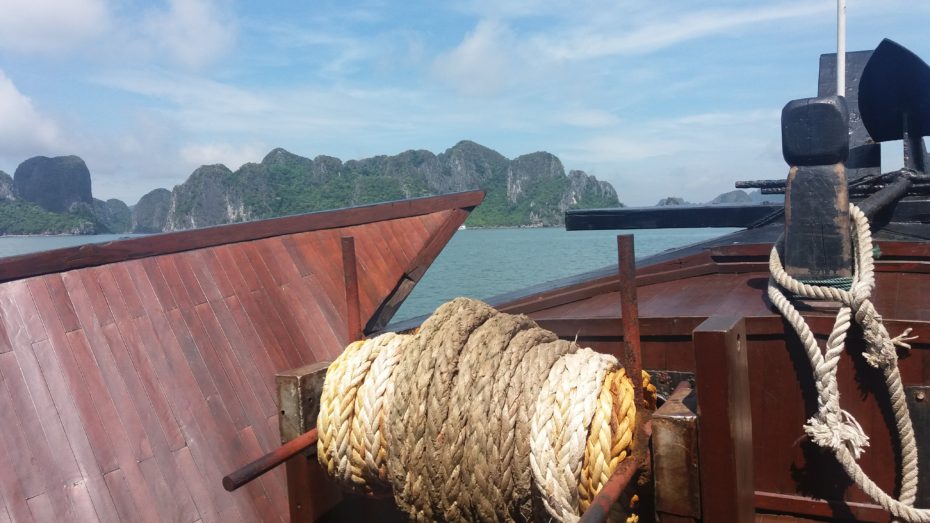
On the deck of our boat
Maybe the surrounding industrial and tourism developments have put the nail in the coffin for Halong Bay as a truly special eco-destination. Of course tourists will continue to visit, in their millions. But all the magic will have been wrung out of it. Or maybe the environmental tide will manage to turn, and with strict regulation Halong Bay will rediscover its majesty. But if Halong Bay has already been sacrificed on the alter of mass-tourism, it can at least serve as a lesson of what not to do. And there are some signs that this lesson has already been taken to heart. Hang Son Doong, the world’s biggest cave, was first explored in 2009 and only recently opened to the public, under strict regulation. Only one tour operator is licensed to take a maximum of 500 tourists to the cave each year, as part of a 5-day hike. Each visitor pays $3,000 USD for the privilege. This is low-impact, high-value tourism.
On our last night on the boat we all had cocktails and had a deep-and-meaningful conversation over dinner. Talk ranged from our unanimous contempt for and fear of Donald Trump, concern about privacy invasion through online data mining and corruption in Vietnam. Then, like many-a-tourist before us, we attempted to identify the real causes of and solutions to global poverty and inequality. As we merrily discussed the merits of income distribution through taxation and welfare, Thuan poked his head in, obviously having overheard us, and said he would like to show us his pay check/reality check – $220 USD per month. This is actually good compared to the average income here in Vietnam (US $1,890). But overall, Vietnam is still a relatively poor country. It places 116th on the Human Development Index, putting it in the ‘medium development’ category about twenty countries below Thailand and a fair bit higher than Laos and Cambodia.
Thuan told us that his parents are farmers, and he grew up poor, eating only vegetables and rice, which Thuan argues is responsible for his skinny frame. Alongside his own earnings, Thuan’s brother brings in $360 a month working for an electronics factory. For this money, his brother works 8 AM till 9 PM each day, with only 2 days off each month. He doesn’t have time for a girlfriend – a major downside in Thuan’s eyes. Thuan himself works 26 days in a row, then gets 4 days off during which time he can hang out with his girlfriend and spend his tips on taking her to the movies and restaurants, though he’s also putting some towards a romantic holiday in Thailand. His main salary goes straight to his Mum, who doesn’t trust him to save for his future (Thuan says he’d blow everything in four days given the chance).
We asked Hong what she thought tourists could do to contribute to Vietnam. She said the most important thing is giving Vietnamese people different perspectives. Providing different ideas about how to live and insights into different countries with different systems of government that demand more accountability from their politicians. She said that ten years ago Halong Bay was like one massive rubbish dump. Yes there’s still garbage today, but it’s much better than it used to be. This, Hong argued, is because of tourists making it clear that they don’t want to holiday in sea of plastic. Hong said just picking up some rubbish was much more valuable than giving ‘tips’ – the easy monetary solution tourists often find for their conflicted consciences.
All this talk of saving the world over our cocktails on a luxury cruise felt like serious champagne-socialism. But I also felt like a nugget of uncomfortable truth was emerging. What every country really needs is not tourist dollars but good government and a clean country, something that only citizens of that country can bring about. This is not to say that tourism can’t have positive effects – it definitely creates jobs and provides new perspectives, but it isn’t a solution to poverty and it won’t magically bestow environmental protection, human rights or democracy on a place. Taking a holiday in a third-world country isn’t ‘doing our bit’ to change the world. But it could be the catalyst for it.
What happens after our holiday? It’s easy for our connection with a country to shrink down to memories, crazy travel stories and photos. But if we want to be ethical travellers, our holiday could and should be just the start of a genuine connection to and commitment to a place that extends long after we return home. Because home is actually where we can make the most difference. Our rich home countries can provide aid. For example USAID funding recently created the Halong-Cat Ba Alliance, which gets all the big companies and the government together to work out how to better protect the bay and comes up with specific recommendations for improving regulation of the bay. Yes, it’s easy to dismiss this as a talkfest, but it’s a huge improvement on a total policy vacuum. So the point being, if you really love Vietnam, don’t get miserly when a generous foreign-aid budget is on the table back home.
And if we can afford to travel, we should also ask ourselves whether we can give more from our own pockets when we get back home. There are lots of not-for-profit organisations achieving real, substantial things. And not just traditional ‘charities’ but maybe even more importantly, organisations that work to create political, environmental and social changes and to defend human rights. It’s easy to get caught up in the cheap beer, foot massages and souvenir-buying frenzy without ever engaging in the startling political realities. Hong and Thuan told us that people can’t openly criticise the government here in Vietnam. They mentioned outspoken critics simply ‘disappearing’. Even the dinner conversation we were having together could get them thrown in jail if the government were to find out about it. They said the only thing that protected them was having the conversation in English, rather than Vietnamese. Hong and Thuan weren’t exaggerating. In March this year, two bloggers were sentenced to three and five years in jail respectively for the dubious charge of ‘abusing democratic freedoms’. The judge found that the blog posts about democracy and social and economic issues ‘distorted the ruling Communist Party’s policies, reduced public trust in the party, and went against the interests of the nation”.
Ultimately the one-and-only route to better government is more educated, informed people who can actually talk freely about what they want their country to look like, and demand more from their leaders. Again, tourism can’t deliver this, but our travels can be the spark we need to realise our global citizenship and provide our financial and political support to these movements.
Of course the most radical thing would be to not travel in the first place, and simply give all your hard-earned money away instead. This way we could literally save lives, rather than simply improving them around the margins. I’m not there yet, but it’s definitely something I’m thinking more and more about.
The names of people mentioned in this blog have been changed.
The title of this story comes from the amazing Gorillaz album ‘Plastic Beach’ which is basically the soundtrack to my Halong Bay trip.

